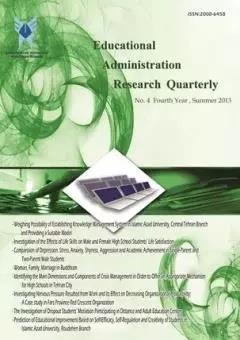An analysis of the process and challenges of adopting Israel's covert diplomacy from The Oslo I Accord to The Abraham Accords
Subject Areas : Educational management
Homayon Afsardir
1
![]() ,
hosein karemefard
2
,
حامد محقق نیا
3
,
hosein karemefard
2
,
حامد محقق نیا
3
![]() ,
asieyeh mahdipour
4
,
asieyeh mahdipour
4
1 -
2 - Associate Professor, Department of Political Science, Ahvaz Branch, Islamic Azad University, Ahvaz, Iran
3 - استادیار گروه علوم سیاسی، دانشکده ادبیات و علوم انسانی، دانشگاه آزاد اسلامی واحد اهواز، اهواز، ایران
4 - Assistant Professor of Political Science, Shahid Chamran University of Ahvaz, Ahvaz, Iran
Keywords: The process of hidden Diplomacy, The Abraham Accords, The Oslo I Accord,
Abstract :
Examining and analyzing the actions, obstacles and challenges of different countries and political regimes in the field of foreign policy requires examining the process and history of their different approaches, however, adopting the approach of secrecy and concealment in international programs and interactions makes the state of knowledge ambiguous and complicated. Of course, this approach has been strengthened among different countries and especially due to the different characteristics of the Zionist regime, in the diplomacy of this regime, in recent years. Although the Zionist regime has achieved success in the field of using covert diplomacy, there have been and still are obstacles and challenges in this field, and paying attention to these issues can provide a proportionate approach in the general perception of this issue.
In this article we were used a descriptive-analytical method and using library sources and texts,
The results were obtained that the covert diplomacy of the regime Zionism plays a facilitating and accelerating role in achieving the goals of this regime's foreign policy and from a historical point of view, it has been inclined to this approach since before 1948, and the adoption of hidden politics has been strengthened in recent years, and of course, it has had tangible results. In its hidden diplomacy, this regime has challenges such as "developing media activities and entering the information age", "countermeasures based on resistance in the region" and "information age and the spread of virtual space".
اخوان مفرد، سیاوش، 1379، اسرائیل در آسیای مرکزی، مجله سیاست دفاعی، شماره 30-29.
امینی، آرمین، 1383، کاوشی بر پایه گرایش واقع گرایی نوکلاسیک؛ عضویت روسیه در ناتو و امنیت ملی ایران، مجله راهبرد.
تاجیک، کاظک؛ کاظمیزند، علی اصغر؛ برزگر، کیهان، 1398، محرمانگی در دیپلماسی؛ تحولات و چشم انداز، فصلنامه مطالعات راهبردی، سال22، شماره2.
جاودانی مقدم، مهدی؛ موسوی زاده، علیرضا، 1387، نقش فرهنگ ملی در سیاست خارجی جمهوری اسلامیایران، دانش سیاسی، سال4.
خانی، محمدحسن؛ مسرور، محمد، 1396، ظهور چین: چالشهای ایالات متحده آمریکا در مواجهه با قدرت روزافزون چین در روابط بین الملل، پژوهشهای روابط بین الملل، دوره1، شماره 24.
خرازي آذر، زهرا و نرگس احساني، 1388، جريانشناسـي جهـاني رسـانههاي بـزرگ، انتشـارات معاونت پژوهشي دانشگاه آزاد اسلامي.
طباطبایی، سید محمد، سلیمانی، علی، 1392، جمهوری اسلامیایران و رژیم صهیونیستی : گسترش فضای هنجاری و تهدیدات ارزشی متقابل، فصل نامه پژوهشهای راهبردی سیاست، سال2، شماره7.
عباسی، اشلقی؛ حمیدفر، حمیدرضا، 1399، اتحاد عربستان سعودی و اسرائیل با آمریکا و پیامدهای آن بر موازنه قدرت و نفوذ جمهوری اسلامیایران در خاورمیانه، فصلنامه مطالعات بین المللی، سال 17، شماره3.
العمله، ابوخالد،1997، اسلو محطة التهوید فلسطین، بیروت، لبنان: دارالکنوز الدبیة.
غالی،پطرس،1381، راه مصر به سوی قدس، فریده مبینی کشه، تهران: اطلاعات.
غفاری فر، حسن، 1387، سلسله صلحهای تحمیلی برای حذف تدریجی هویت فلسطینی 1978-2007، علوم سیاسی، سال 11، شماره 44.
قادری حاجت مصطفی، جودی حسین، حیدریان سجاد، 1399، تبیین ژئوپلیتیکی بازساخت ریملند در چارچوب صلح ابراهیم، آمايش سیاسی فضا ، دوره1، شماره3.
کامران دستجردی، حسن؛ متقی، افشین؛ رشیدی، مصطفی، 1390، حضور اسرائیل در قفقاز و تأثیر آن بر امنیت ملی جمهوری اسلامیایران، فصلنامه انجمن جغرافیای ایران، سال9، شماره 28.
کامل، محمد ابراهیم،1368، صلح موعود در توافقنامههای کمپ دیوید، ترجمه: محمد درخشنده، تهران: انتشارات امیرکبیر.
کریمی، ابوالفضل، رحیمی، مختار، قهرمانی، میثم، 1396، محور مقاومت و سیاست خارجی رژیم صهیونیستی، تهران: شاپرک سرخ
گنجی دوست، محمد، 1387، تحولات دیپلماسی در عصر اطلاعات، فصلنامه سیاست، دوره1، شماره 38 .
محمودی رجا، سیدذکریا؛ باقری دولت ابادی، علی؛ راوش، بهنام، 1397، بررسی محور مقاومت و آینده نظام سلطه با استفاده از نظریه نظام جهانی، بیداری اسلامی، دوره7، شماره 14.
معرض، جلال عبدالله، ترجمه یحیی عطارزاده، «همکاری نظامیترکیه و اسرائیل: اهداف و پیامدها»، مجله المستقبل العربی، به نقل از: روزنامه همشهری، 12/11/1385.
ملکی، محمدرضا؛ محمدزاده ابراهیمی، فرزاد، 1399، چشم انداز صلح خاورمیانه در سایه عادی سازی روابط اسراییل و جهان عرب، فصلنامه مطالعات بین المللی، سال 17، شماره3.
وحید،عبدالمجید، 1379، کمپ دیوید پس از دو دهه، ترجمه: مهرداد کیائی، تهران :انتشارات اطلاعات.
وهابیان، حسین؛ باکری، احسان، 1383، آریل شارون، جاودانگی خون بار، تهران: روایت فتح.
Aras, Bulent, 1998, “Post-cold war Realities: Israel’s Sterategy Azerbaijan and Centeral Asia”, Middle East Policy, vol.7, No.4.
Cornell, E.Sovant, 2001, Small Nations and Great Power:A Study of Ethno Political Conflict in the Caucasus, London: Curzone press. Firestone, Charles M. ; Executive Director, The ASPEN Institute, Communications and Society Program, Washington, DC, 2003.; in his Forward note: p- VI;
to:Bollier, David
Hyman, Antony, 2001, Centeral Asia and the middle East: the Emerging links, London: zed books. Islamov, Elder. Palukhon, Eihan. 2000 ,“The Old and New Players in Caucasian Politics” Central Asia and the Caucasus Journal of Social and political Studies.
Lewis, B. )1995( The Middle East: A Brief History of the Last 2,000 Years, New York:Scribner
Mufi, Malik. 1998, “Daring and Caution in Turkish Foreign Policy”, The Middle East Journal, No. 4. Murray, Stuart (2016) Secret “versus” open diplomacy across the ages, in: Bjola, Corneliu & Murray, Stuart (2016) Secret diplomacy: concepts, contexts and cases, New York: Routledge.
Prez, Shimon, 1993,The New Middle East, USA; New York press.
Rabinovich, Itmar (2015), “Israel and the Changing Middle East”, Middle East Memo, No. 34
Ruggie, John Gerard: "Territoriality and Beyond: Problematizing Modernity in International Relations," International Organization 47 (Winter 1993).
Zriagelskaya. D, Irena, 1994, Centeral Asia and Transcausia: New Geopolitical, we port con. Ann London: coreen wood press.


